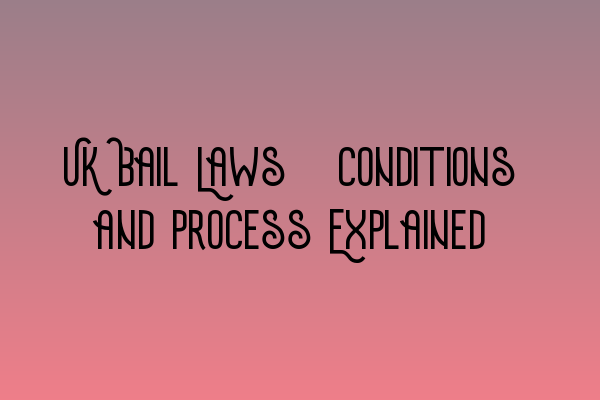UK Bail Laws: Conditions and Process Explained
As a leading expert in criminal law, SQE Criminal Law & Practice Law UK is dedicated to providing comprehensive information to individuals facing legal issues in the UK. In this blog post, we will delve into the intricacies of UK bail laws – a topic often misunderstood by many. Whether you are a defendant, a legal professional, or simply someone who wants to expand their knowledge, this article will serve as your guide to understanding the conditions and process of UK bail laws.
What is Bail?
Before we dive into the specifics, let’s start with a brief explanation of what bail actually means. Bail is a legal process that allows a person accused of a crime to be released from custody while awaiting trial. It is designed to uphold the principle of “innocent until proven guilty” while ensuring that the accused will appear in court for their trial.
The Bail Conditions
When granting bail, the court may impose certain conditions on the accused to ensure their compliance with the legal process and safeguard public safety. These conditions may include:
- Surrendering travel documents: In some cases, the court may require the accused to surrender their passport or any other travel documents to prevent them from leaving the country.
- Reporting to a specified police station: The accused may be required to regularly visit and sign in at a designated police station to demonstrate their presence and cooperation with the legal proceedings.
- Residing at a particular address: The court may demand that the accused reside at a specific address and inform the authorities if they intend to change their residence during the bail period.
- Restriction on contact: To protect potential witnesses or victims, the court may prohibit the accused from contacting certain individuals involved in the case.
- Curfew: A curfew may be imposed, requiring the accused to remain at their residence during specified hours.
These are just a few examples of the conditions that can be imposed by the court. The specific conditions will depend on the circumstances of the case and the judge’s discretion.
The Bail Process
Now that we understand the concept of bail and the potential conditions, let’s take a closer look at the bail process itself:
- Arrest and custody: When a person is arrested, they are usually taken into custody. At this stage, the police will assess whether the accused can be released on bail or if they need to be held in custody until their trial.
- Bail application: If the police consider releasing the accused on bail, they will present the case to a custody officer who will determine whether to grant bail or not. In some cases, the decision may be referred to a court.
- Court hearing: If the bail application is referred to a court, a hearing will take place. The court will consider various factors, such as the seriousness of the alleged offense, the accused’s criminal history, and the likelihood of them appearing for trial. The court will then decide whether to grant bail and, if so, the conditions to be imposed.
- Compliance: Once bail is granted, the accused must comply with the imposed conditions. Failure to do so may result in the revocation of bail and the accused being returned to custody.
It is important to note that each case is unique, and the bail process may have variations depending on the specific circumstances and legal requirements.
Seeking Legal Guidance
If you or someone you know is facing criminal charges and requires legal representation, it is crucial to seek expert advice from a reputable law firm. At SQE Criminal Law & Practice Law UK, we specialize in providing comprehensive legal support for various criminal matters, including bail applications. Our experienced team of solicitors can guide you through the entire process, ensuring your rights are protected and your case receives the attention it deserves.
For more information on legal representation in the UK, check out our related article: Legal Representation for Delaware LLCs in the UK: Expert Advice.
Conclusion
Understanding the conditions and process of UK bail laws is essential for anyone involved in the criminal justice system. By familiarizing yourself with the bail conditions and the steps involved in the bail process, you can navigate this complex area of law with confidence.
If you have any further questions or require legal assistance, do not hesitate to reach out to SQE Criminal Law & Practice Law UK. Our dedicated team is here to support you every step of the way.
Related Articles:
